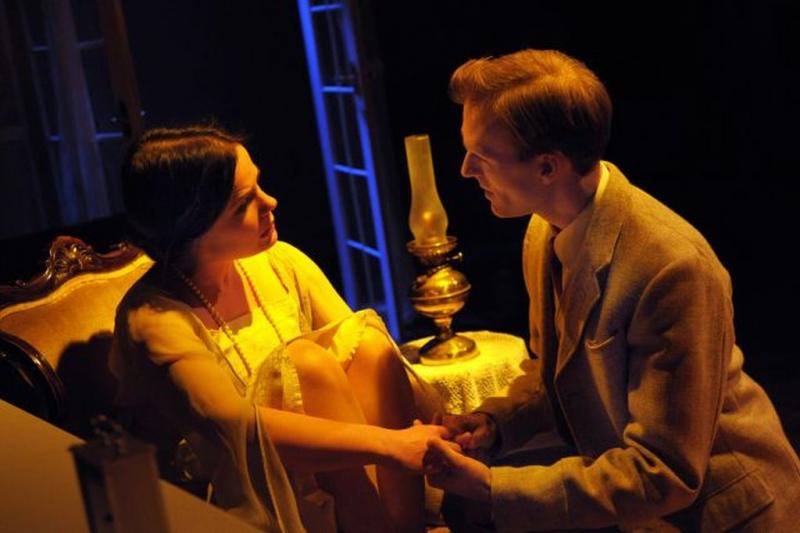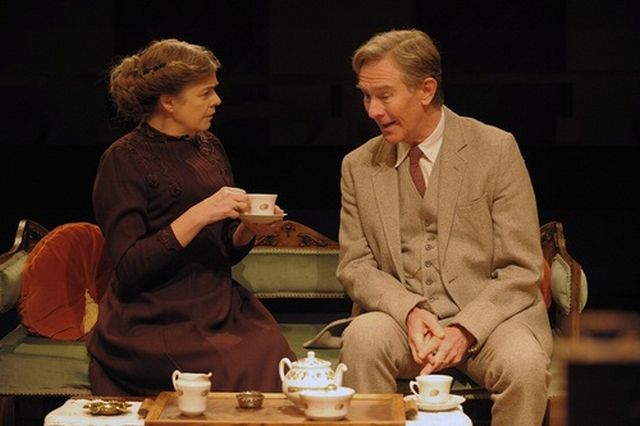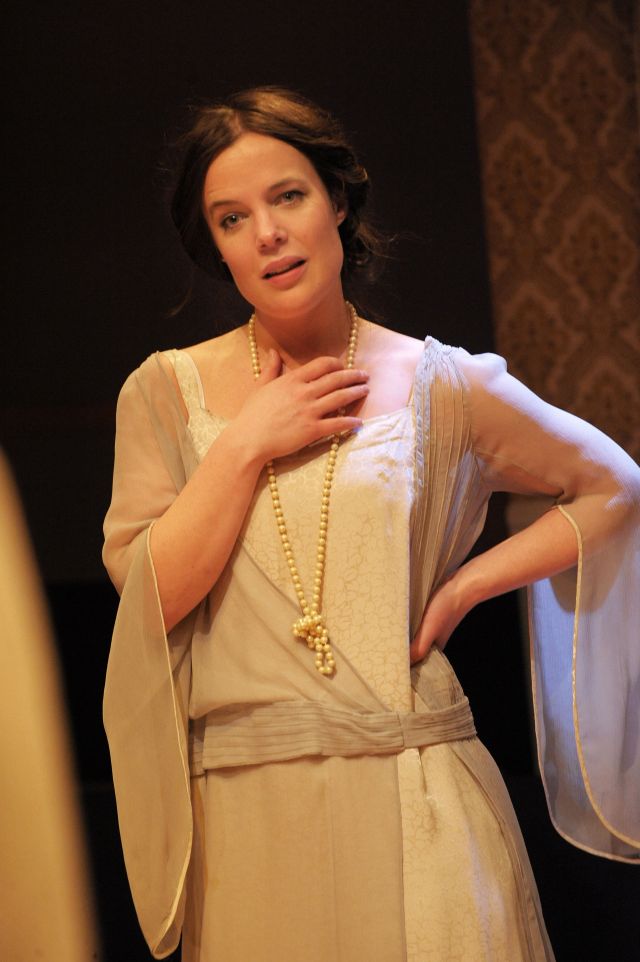The Stepmother, Orange Tree Theatre | reviews, news & interviews
The Stepmother, Orange Tree Theatre
The Stepmother, Orange Tree Theatre
Neglected Githa Sowerby play pitches human kindness against a hissable anti-hero

When's the last time you encountered a play with a hissable anti-hero and a young heroine who radiates charity, decency, and all things good?
Collectors of dramatic curiosities will flock to this as they are to the Finborough's somewhat comparable London Wall, though that later play remains the superior text. Both productions have much to say about the role of women in English society of a bygone age, and they share a focus on orphaned heroines who come unexpectedly into money. That said, John Van Druten's saga of office life in a City law firm offers no one on a par with The Stepmother's all but moustache-twirling paterfamilias, Eustace Gayden (Christopher Ravenscroft, pictured below with Julia Watson), when it comes to stage villains you love to hate.
 A widower with two daughters and never enough cash, Eustace sees a financial opportunity in the penniless teenager who had been caring for his recently dead sister and who against expectation has been named the beneficiary of the late Fanny's small fortune. Does 19-year-old Lois Relph (Katie McGuinness, pictured below) know what to do with this inheritance from her erstwhile employer? Eustace will tend to that, thank you very much, which he accomplishes by marrying this guileless and trusting young soul and obtaining power of attorney over her dosh. After all, or so he reasons, the money should have come to him in any case.
A widower with two daughters and never enough cash, Eustace sees a financial opportunity in the penniless teenager who had been caring for his recently dead sister and who against expectation has been named the beneficiary of the late Fanny's small fortune. Does 19-year-old Lois Relph (Katie McGuinness, pictured below) know what to do with this inheritance from her erstwhile employer? Eustace will tend to that, thank you very much, which he accomplishes by marrying this guileless and trusting young soul and obtaining power of attorney over her dosh. After all, or so he reasons, the money should have come to him in any case.
What ensues owes not a little to Ibsen, not least as here presented in an astute Sam Walters production that visibly tightens the screws on all the characters. As was true of last year's much-acclaimed Young Vic revival of A Doll's House, one is always aware of dastardly behaviour rooted in economic need: money is the motivating factor here, and one can feel Eustace cracking under a financially needful weight that pushes him perilously close to domestic violence. Robyn Wilson's immaculately tailored suits are no guarantee of civility from the people wearing them.
 The psychology, such as it is, extends to Sowerby subverting expectations prompted by the title. Far from being the wicked stepmother of lore, Lois in fact becomes an advocate and ally for Eustace's two daughters, who are of course far closer in age to her than she is to her husband. And in trying to facilitate the marriage of the lovesick Monica to the "rather decent" Cyril (Alan Morrissey), Lois is allowing the younger woman the satisfying partnership that has been denied to her.Lois does have a more well-intentioned suitor in the dashing form of Peter Holland (Christopher Naylor), though he, too, has his limits when it comes to commerce. A swirl of secrets and lies carries through to an ending that gives the plucky Lois pride of place, even if its specific mode of expression - the serving of tea - is every bit as English as Sowerby's penchant for using the adjective "queer" as it if were going out of style.
The psychology, such as it is, extends to Sowerby subverting expectations prompted by the title. Far from being the wicked stepmother of lore, Lois in fact becomes an advocate and ally for Eustace's two daughters, who are of course far closer in age to her than she is to her husband. And in trying to facilitate the marriage of the lovesick Monica to the "rather decent" Cyril (Alan Morrissey), Lois is allowing the younger woman the satisfying partnership that has been denied to her.Lois does have a more well-intentioned suitor in the dashing form of Peter Holland (Christopher Naylor), though he, too, has his limits when it comes to commerce. A swirl of secrets and lies carries through to an ending that gives the plucky Lois pride of place, even if its specific mode of expression - the serving of tea - is every bit as English as Sowerby's penchant for using the adjective "queer" as it if were going out of style.
Best known for her earlier, barnstorming success Rutherford and Son (a one-time Katie Mitchell venture to be revived imminently by Jonathan Miller), Sowerby never saw The Stepmother professionally performed, and the piece remains more interesting for its content than for anything about the language itself (a lot of the writing comes from the "it can't be, can it" school of cod-melodrama). It's heartening to see a play in which virtue and generosity are seen to prevail, and if those qualities here apply more to women than to men, well, the blokes on this evidence don't deserve a cuppa.
The future of Arts Journalism
You can stop theartsdesk.com closing!
We urgently need financing to survive. Our fundraising drive has thus far raised £49,000 but we need to reach £100,000 or we will be forced to close. Please contribute here: https://gofund.me/c3f6033d
And if you can forward this information to anyone who might assist, we’d be grateful.

Subscribe to theartsdesk.com
Thank you for continuing to read our work on theartsdesk.com. For unlimited access to every article in its entirety, including our archive of more than 15,000 pieces, we're asking for £5 per month or £40 per year. We feel it's a very good deal, and hope you do too.
To take a subscription now simply click here.
And if you're looking for that extra gift for a friend or family member, why not treat them to a theartsdesk.com gift subscription?
more Theatre
 Tom at the Farm, Edinburgh Fringe 2025 review - desire and disgust
A visually stunning stage re-adaptation of a recent gay classic plunges the audience into blood and earth
Tom at the Farm, Edinburgh Fringe 2025 review - desire and disgust
A visually stunning stage re-adaptation of a recent gay classic plunges the audience into blood and earth
 Works and Days, Edinburgh International Festival 2025 review - jaw-dropping theatrical ambition
Nothing less than the history of human civilisation is the theme of FC Bergman's visually stunning show
Works and Days, Edinburgh International Festival 2025 review - jaw-dropping theatrical ambition
Nothing less than the history of human civilisation is the theme of FC Bergman's visually stunning show
 Every Brilliant Thing, @sohoplace review - return of the comedy about suicide that lifts the spirits
Lenny Henry is the ideal ringmaster for this exercise in audience participation
Every Brilliant Thing, @sohoplace review - return of the comedy about suicide that lifts the spirits
Lenny Henry is the ideal ringmaster for this exercise in audience participation
 Edinburgh Fringe 2025 reviews: The Beautiful Future is Coming / She's Behind You
A deft, epoch-straddling climate six-hander and a celebration (and take-down) of the pantomime dame at the Traverse Theatre
Edinburgh Fringe 2025 reviews: The Beautiful Future is Coming / She's Behind You
A deft, epoch-straddling climate six-hander and a celebration (and take-down) of the pantomime dame at the Traverse Theatre
 Good Night, Oscar, Barbican review - sad story of a Hollywood great's meltdown, with a dazzling turn by Sean Hayes
Oscar Levant is an ideal subject to refresh the debate about media freedom
Good Night, Oscar, Barbican review - sad story of a Hollywood great's meltdown, with a dazzling turn by Sean Hayes
Oscar Levant is an ideal subject to refresh the debate about media freedom
 Edinburgh Fringe 2025 reviews - Monstering the Rocketman by Henry Naylor / Alex Berr
Tabloid excess in the 1980s; gallows humour in reflections on life and death
Edinburgh Fringe 2025 reviews - Monstering the Rocketman by Henry Naylor / Alex Berr
Tabloid excess in the 1980s; gallows humour in reflections on life and death
 Edinburgh Fringe 2025 reviews: Lost Lear / Consumed
Twists in the tail bring revelations in two fine shows at the Traverse Theatre
Edinburgh Fringe 2025 reviews: Lost Lear / Consumed
Twists in the tail bring revelations in two fine shows at the Traverse Theatre
 Make It Happen, Edinburgh International Festival 2025 review - tutting at naughtiness
James Graham's dazzling comedy-drama on the rise and fall of RBS fails to snarl
Make It Happen, Edinburgh International Festival 2025 review - tutting at naughtiness
James Graham's dazzling comedy-drama on the rise and fall of RBS fails to snarl
 Edinburgh Fringe 2025 reviews: I'm Ready To Talk Now / RIFT
An intimate one-to-one encounter and an examination of brotherly love at the Traverse Theatre
Edinburgh Fringe 2025 reviews: I'm Ready To Talk Now / RIFT
An intimate one-to-one encounter and an examination of brotherly love at the Traverse Theatre
 Top Hat, Chichester Festival Theatre review - top spectacle but book tails off
Glitz and glamour in revived dance show based on Fred and Ginger's movie
Top Hat, Chichester Festival Theatre review - top spectacle but book tails off
Glitz and glamour in revived dance show based on Fred and Ginger's movie
 Edinburgh Fringe 2025 reviews: Alright Sunshine / K Mak at the Planetarium / PAINKILLERS
Three early Fringe theatre shows offer blissed-out beats, identity questions and powerful drama
Edinburgh Fringe 2025 reviews: Alright Sunshine / K Mak at the Planetarium / PAINKILLERS
Three early Fringe theatre shows offer blissed-out beats, identity questions and powerful drama
 The Daughter of Time, Charing Cross Theatre review - unfocused version of novel that cleared Richard III
The writer did impressive research but shouldn't have fleshed out Josephine Tey’s story
The Daughter of Time, Charing Cross Theatre review - unfocused version of novel that cleared Richard III
The writer did impressive research but shouldn't have fleshed out Josephine Tey’s story

Add comment